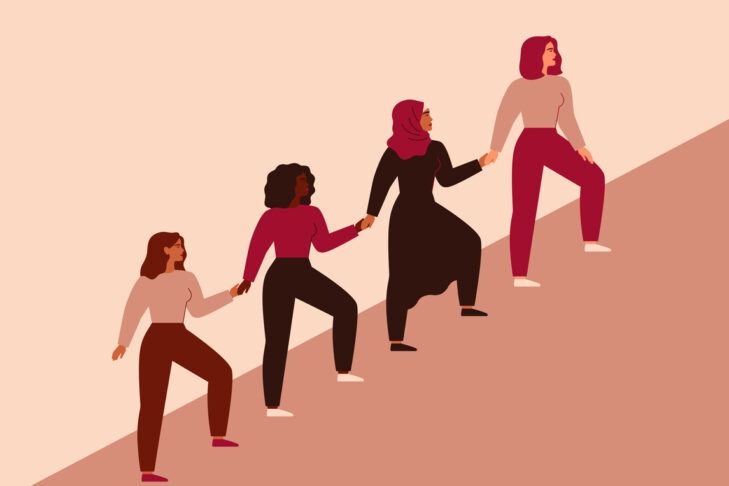It has been more than four decades since women joined the workforce in significant numbers. Despite the ongoing growth of women in the workplace, the gender gap persists when it comes to the percentage of women CEOs of Fortune 500 companies. This is just as true for Jewish organizations. A recent report from Leading Edge, a prominent think tank conducting original research on Jewish organizations, found that 70% of the workforce in Jewish nonprofits is made up of women and those who identify as female. Yet women represent only 30% of the CEOs of those nonprofits.
Writing three years ago about gender equity in eJewish Philanthropy, Leading Edge president and CEO Gali Cooks noted: “As president and CEO of Leading Edge, I represent a minority of women who hold top leadership positions in the Jewish nonprofit sector. At Leading Edge, an organization that focuses on building a robust leadership pipeline for Jewish nonprofits, I am acutely aware that I have broken through what is still a glass ceiling in 2018.”
In 2019, Jewish Women International (JWI) notably responded to Cooks’s assertion. For more than a century, JWI has worked on behalf of “women and girls of every race, culture, gender identity, sexual orientation and ability [to] thrive in healthy relationships, control their financial futures and realize the full potential of their personal strength.” That dynamic mandate naturally extended to cultivating and mentoring Jewish women leaders. In response to the challenge of “clearing the path for women to ascend to executive positions” vacated by retiring baby boomer CEOs, the Jewish Communal Women’s Leadership Project was created with the bold goal of “claiming the corner office” for women CEOs. This past year, the project grew from a regional program into an international fellowship.
Among the features of the fellowship year are monthly workshops taught by professional Jewish women. These women are leaders in business, finance, media and development. Many of them have been among the honorees of JWI’s Women to Watch.
Fifty-nine women from across the United States, Israel and Europe were awarded fellowships this year. Eight of them make up the New England cohort—seven are based in the Boston area and one is from the Hartford, Connecticut, area. Like all of the fellows, these eight fellowship recipients have met the challenge of adapting their jobs for an unprecedented virtual world. In interviews with JewishBoston, the common denominator among the women was gratitude for having access to a virtual network that effectively fills in the missing and crucial gap of having in-person community gatherings in these pandemic times.
Sarah Abramson
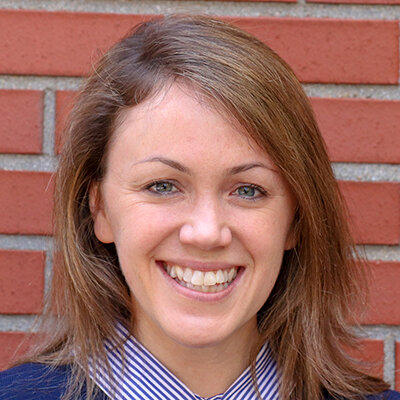
Sarah Abramson is the senior vice president for strategy and impact at Combined Jewish Philanthropies. She came to CJP in 2015 from Yad Chessed, a Jewish agency that provides financial assistance, and served as the group’s first professional executive director. Abramson began at CJP as an associate vice president for caring and social justice. In 2017, she was promoted to the organization’s executive team, serving as senior vice president for strategy and impact. Abramson holds a Ph.D. in sociology from the London School of Economics.
In conversation with JewishBoston, Abramson noted that CJP is a predominantly female-led workforce with strong women leaders. Of the six members on CJP’s executive team, four are women. During the fellowship, her goals are to interrogate her awareness of gender biases, how gender identity is seen in the world and perceived in the workplace and lifting up strong female leaders in Jewish spaces.
“I have been on a journey of understanding that feminism is not just about women anymore, but about gender,” Abramson said. “I am hopeful through my participation in JWI and the networks of my colleagues that we can interrogate what it means to lift up women in a world where gender now means much more than women and men.”
Abramson looks forward “to wrestling together [in this fellowship] with issues that are ubiquitous.” She also observed that interacting with other fellows in the Zoom chat space during a presentation is its own unique learning experience. She said that people integrate themes from the subject on hand into their work and lives. “I don’t think I will leave the fellowship as the same person who came to it,” she added. She already sees the group as agents of change who can collectively “change the world.”
Miriam Berkowitz Blue
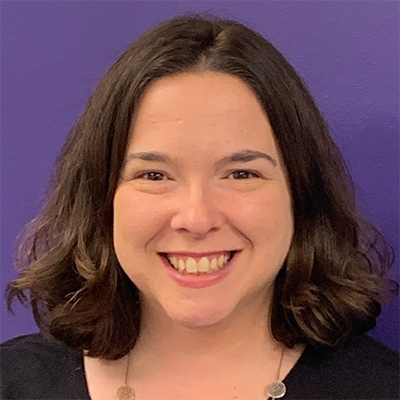
Miriam Berkowitz Blue recently made Jewish communal history as the first woman to be appointed executive director of the Hillel Council of New England, which supports Hillel on northeast college campuses that often deal with antisemitism, issues related to BDS and now how the pandemic is impacting the college experience. The Hillel Council’s executive directorship in New England has not changed hands for over three decades, Blue, who starts next month, anticipates that the JWI fellowship will support her transition to her new leadership role.
Blue noted that she is grateful for the camaraderie among the women in the fellowship. “Sometimes I feel that I operate in a vacuum,” she said. “It’s lonely working at home. But aside from the pandemic, we were never a cubicle kind of office. There is no water-cooler activity. We’re always visiting multiple campuses and out in the field being relational.”
The fellowship is a natural addition to Blue’s resume. A graduate of Wellesley College, she said, “Feminism and the importance of women lifting up women is a central tenet to my identity; it’s the core of everything I do.” Among her extracurricular activities is her involvement with Mayyim Hayyim, where she sits on the board. “Mayyim Hayyim is a woman-led organization, which is an exemplary model of pluralism, inclusivity and beyond,” she noted.
Her hopes for her fellowship year include learning from her colleagues. “Learning is inherent to Judaism,” she said. “We read in Pirke Avot, ‘Who is wise? One who learns from every person.’ Everyone has something to teach and something to learn from one another.” She’s grateful for the virtual one-on-one conversations she has had with some of the women in the Boston cohort. “Finding those unplanned moments and implicit connections are so valuable,” she said. “As an educator, I’m always looking for those things.”
Miriam Brander
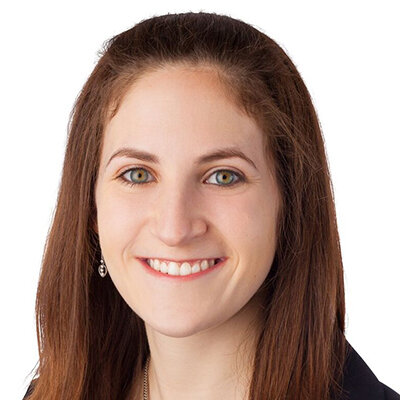
Miriam Brander is the chief operating officer at Jewish Family Services of Greater Hartford (JFS). Taking on a leadership role in a smaller Jewish community means that Brander goes beyond her job description to oversee community programs, such as Connecticut’s Holocaust Survivors Program and the local food pantry.
Brander finds that while she mostly works behind the scenes, she also interacts with clients. As she observed, she’s not simply behind a static spreadsheet. “Those spreadsheets take on a life of their own,” she said. “I get to wear a lot of hats. I dabble in development, deal with building safety and manage budgets. It’s always exciting. There are so many pieces to this job that keep me busy and engaged. I enjoy the smaller community environment where everything is contained in one job.”
Brander came to her new role from the Jewish Federation of Greater Hartford, where she served as the director of community impact and evaluation. Her responsibilities in that job included “reimagining the allocations process to focus community agencies on a culture of outcome.” However, six months into her new job at JFS, her role drastically shifted due to the pandemic, and she focused more on the operations part of the job description.
She’s grateful for this year of fellowship with other Jewish women. She sees connecting with others as a crucial part of her job and expects she’ll be calling on her newly acquired network for advice and support in the coming years. “My hope for the Jewish communal world is to hear more about women in leadership roles; our JWI cohort is a starting list for search firms filling these positions,” she added.
Rachel Eisen
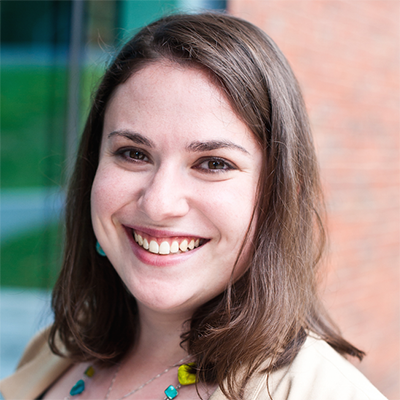
Rachel Eisen is the chief operations and advancement officer at Mayyim Hayyim Living Waters Community Mikveh and Education Center. A graduate of Brandeis University’s Hornstein Program in Jewish Professional Leadership and Near Eastern and Judaic Studies, Eisen is also a co-founder of Mentoring For Equity, a national initiative connecting women and those who identify as female in the Jewish communal world with mentors. The goal, said Eisen, is to close the gender leadership gap in the Jewish nonprofit sector while also working for gender equity.
JWI’s Communal Leadership Project was a plausible next step for Eisen. She has high hopes for her fellowship year, including acquiring new skills and adding to her ongoing network. She said that one of the important things for women’s leadership development is to make women aware that they are not alone. “At the moment, the numbers are not tilted in our favor with regard to leadership roles in the Jewish community, but I believe the tide is changing,” she said. “This fellowship makes clear that we have each other and we can rely on each other.” She added that an important caveat of leadership “is not always knowing the right answer but knowing who to go to with the right answer.”
Eisen also pointed out that statistics show that many women don’t apply for a job if they don’t meet all the criteria. “It’s important to realize that although we don’t check off all the boxes, we are really qualified and a great fit for a given position,” she said. “That belief almost prevented me from applying for my current job at Mayyim Hayyim. We need to give women the professional resources to overcome this barrier.”
Eisen counts the JWI fellowship as a critical resource in her professional life. “I hope there continue to be opportunities like this fellowship so more women can participate,” she said. “Increasing these opportunities can only do good in creating a more skilled, competent and confident field of Jewish women leaders.”
Shira Kraft
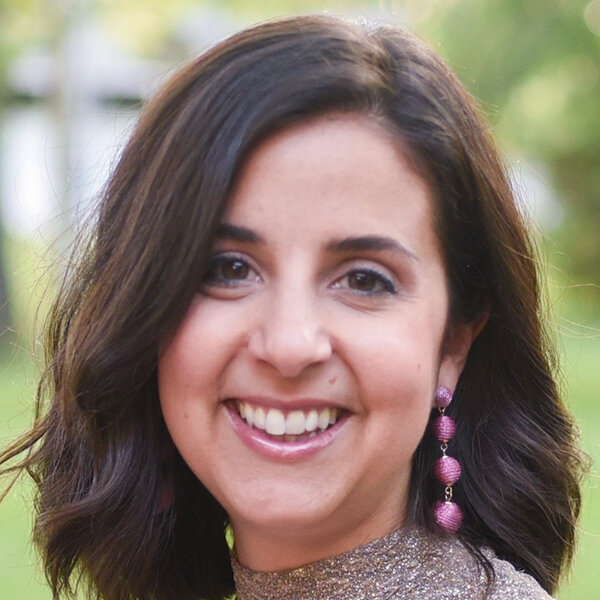
Shira Kraft serves as the chief communications and development officer for Jewish Women’s Archive (JWA). She plays an integral role in elevating women’s voices and documenting their stories. Kraft describes herself as a lifelong feminist. At Barnard College, gender equity and women’s empowerment were fundamental to her studies in art history and the visual arts. Delving into feminist topics has been evident in her job history. Before joining JWA, Shira directed Nishmah: The St. Louis Women’s Project, which she noted “inspired women and girls to live richer, more purposeful lives.”
Kraft said that early in the pandemic, JWA’s leadership saw opportunities to engage with their audience in a new way. The pivot to online programs for an organization, which already presented exhibits and archival material online, was a quick and feasible one. “My role as the external-facing senior staff person was to build relationships with donors, board members and stakeholders,” she said. “We had to reimagine how to build those relationships in a pandemic.”
At the outset of the pandemic, JWA offered Quarantine(ish) Book Talks, an online offering that virtually gathered people to discuss books with featured authors. Kraft noted that online programs allowed for more global presence in their audiences. “I see these webinars benefiting my work in two ways,” she said. “We have grown our audience by 35% in the past year. My role is to think about how we introduce a new audience to the breadth of JWA’s work and cultivate a pipeline of support.”
Concerning the JWI fellowship, Kraft is grateful for a space accorded to senior-level women as they focus on their professional development. “Many of us are still not at the peak of our careers; there is more room for us to explore in this community space,” she said. “Having a network of people cheering each other on and leading one another is a bold statement about the future of women’s leadership in Jewish spaces.”
Kate O’Bannon
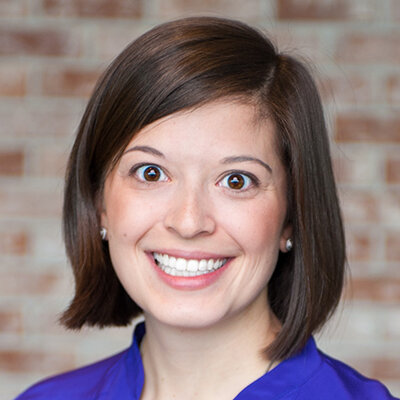
Kate O’Bannon is participating in the JWI fellowship as senior director of strategy and an executive team member at Repair the World. O’Bannon is proud to work at her organization. “‘Make service’ is a defining element of American Jewish life. Our mission involves mobilizing Jews in their communities to take action in pursuit of a just world through service expressing Judaism and Jewish identity.” O’Bannon pointed out that Repair the World’s target demographic wants its Jewish communities to reflect multiracial and multiethnic groupings. To that end, Repair the World welcomes Jews and those who are not Jewish to work alongside one another in domestic social justice projects.
Among O’Bannon’s responsibilities is overseeing the organization’s strategic growth and planning, governance and development. She works closely with Repair the World’s CEO team, its board and key stakeholders. O’Bannon came to her current role with an impressive resume of tikkun olam projects and relationship-building. She worked for the Charles and Lynn Schusterman Family Philanthropies, where she assisted in the foundation’s efforts to connect and support global networks of young Jewish adults.
O’Bannon said the JWI fellowship has been an incredible opportunity. “It’s also been personally amazing for me to have all these wonderful women as part of it,” she said. She’s impressed by the network of women whom she says come with a diversity of backgrounds and experiences.
O’Bannon herself has an affecting personal background—she is a proud Jew who was raised in an interfaith family. As a multiracial Jew (she is part Philippine), she looks to her mother and grandmother for inspiration as strong Jewish women. “They make me think about the power of female leadership,” she said. “I always feel so humbled by the leadership opportunities that have come my way. I do them through my multiracial Jewish lens and my story of identity. I constantly think about how our Jewish world can continue thriving.”
Early in her fellowship year, O’Bannon has already felt the power of relationships and a network of other Jewish women professionals on hand. She looks forward to “being part of a program in which we think how we might get to a place of 50/50 parity in leadership.” She added, “I hugely respect JWI for being part of that change and part of a bigger change in our world.”
Rachel Silverman
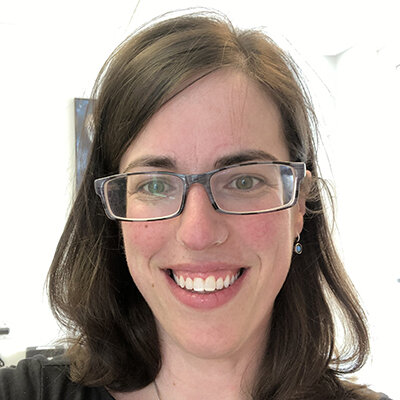
A rabbi who received ordination from The Rabbinical School of JTS, Rachel Silverman serves as rabbi at Temple Israel in Sharon and was formerly a rabbi at Congregation Kehillath Israel in Brookline. Silverman also has a master’s degree in Jewish education from The William Davidson Graduate School of Jewish Education at JTS. A fun factoid about her is she created the T-shirt “Real Men Marry Rabbis” as a rabbinical student. The T-shirt had a memorable debut and is part of the collection at the National Museum of American Jewish History in Philadelphia.
Silverman noted that the fellowship has enabled her to pause and think about Jewish women’s leadership. She has been pondering what direction her own leadership is going, what skills she needs to get there and what kind of mentorship future Jewish women leaders need. She cited that a recent session in the fellowship on “The Coming Hybrid Revolution” helped her clarify her thoughts on leading an organization in 2021—a time that is hopefully, but not necessarily, near the end of the COVID era. “How can we use technology to our advantage?” she asked. “When people return to their offices, do we still have a virtual lunch and learn in-person, together? The prospect of weekly Torah learning without logistics getting in the way is appealing. The seminar was a wonderful opportunity to step out of the day-to-day and focus on the future and planning of leadership development.”
Like her colleagues interviewed for this piece, Silverman values the networking opportunities the fellowship offers. She said her work feeds into the fellowship and she’s happy to have colleagues to rely on while coming back from COVID. She also sees the fellowship advancing Jewish women personally and professionally.
Silverman is keen to brush off the writing skills and overall confidence she garnered when she participated in The OpEd Project, a series of workshops that encourages women to have their opinions heard in the public square. Silverman views the JWI fellowship as similarly valuing women’s opinions and listening to their ideas. “JWI’s Communal Leadership Project also reinforces confidence building,” she said. “I’m a congregational rabbi, and the fellowship enables me to be more vision-oriented and big-picture oriented with other Jewish women leaders. It also helps me think through the question of how this relates to the synagogue community. It’s an important reframing of what we know.”
Shira Strosberg
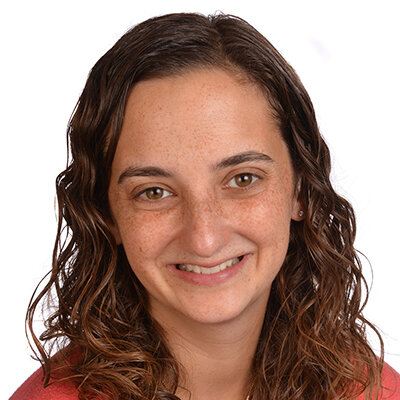
Shira Strosberg is a Jewish educator who is currently the director of enrollment and advancement at Solomon Schechter Day School of Greater Boston (SSDS). Over the past decade at SSDS, she has also held positions in communications, marketing, admissions and development. Working in so many areas of the school has given her a holistic picture of SSDS in particular and Jewish education in general. Strosberg noted that joining the JWI fellowship has “enabled me to be part of a group of women who have also been thinking about having the biggest impact possible on their communities. I wanted to grow by learning from experts in the field of leadership and applying it to my role at Schechter.”
Strosberg was among the interviewees impressed with a session given by Erica Keswin, a workplace strategist, business coach and the author of “Rituals Roadmap: The Human Way to Transform Everyday Routines into Workplace Magic.” Strosberg said Keswin spoke about the psychology of rituals and encouraged participants to think about rituals relevant to their work. “The session inspired me to think about rituals important for families, new students, donors and others,” she said. “Rituals are also important in onboarding and exit interviews. They enhance purpose and psychological safety in the workplace, and effectively empower people to do their best. After the session, I asked myself, what makes something a ritual and how do I create a roadmap for it?” Strosberg cited the SSDS weekly program “This I Believe,” in which a different speaker shares core beliefs or obstacles they have overcome. “The program has become a key ritual at school,” she noted.
Strosberg said she looks forward to connecting in-person with the other women in the New England cohort. “I miss seeing people in this time of COVID,” she said. “In addition to my cohort, there are many people from the New England area I want to connect with professionally. I also look forward to seeing old friends.”


